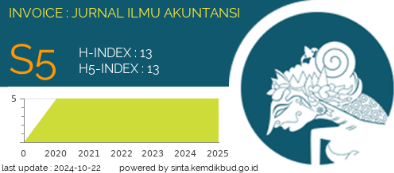PENGARUH PENGENDALIAN INTERNAL, GOOD CORPORATE GOVERNANCE, DAN SISTEM PENGUKURAN KINERJA TERHADAP PENCEGAHAN FRAUD (Studi kasus pada Instansi Pemerintah di Daerah Istimewa Yogyakarta)
Abstract
This study aims to examine the effect of internal control, good corporate governance, and performance measurement system on fraud prevention in government agencies of the Special Region of Yogyakarta. The method used in this research a quantitative method in the form of primary data using a questionnaire. The sampling technique used was the purposive sampling method. The population in this study were permanent employees and non-permanent employees in the Special Region of Yogyakarta with a sample size of 80 respondents. Data collection is done by giving questionnaires directly to respondents via a google form. The data in this study were tested using the Software Statistical Package for Social Sciences (SPSS) version 20. The results of this study indicate that internal control does not affect and fraud prevention, while good corporate governance and performance measurement system have a positive effect on fraud prevention.
Keywords: Internal Control, Good Corporate Governance, Performance Measurement System, Fraud Prevention
Full Text:
PDFReferences
(FCGI), F. for C. G. in I. (2001). Seri Tata Kelola (Corporate Governance) (Jilid 2). http://fcgi.org.id.
Akbar, R. (2013). the Influence of Information, Organizational Objectives and Targets, and External Pressure Towards the Adoption of Performance Measurement System in Public Sector. Journal of Indonesian Economy and Business, 28(1), 62–83. https://doi.org/10.22146/jieb.6230
Aksa, A. F. (2018). Pencegahan dan Deteksi Kasus Korupsi pada Sektor Publik dengan Fraud Triangle. Jurnal Ekonomi, Bisnis, Dan Akuntansi (JEBA), 20(4), 1–17.
Arfah, E. A. (2011). Pengaruh Penerapan Pengendalian Internal Terhadap Pencegahan Fraud Pengadaan Barang Dan Implikasinya Pada Kinerja Keuangan ( Studi pada Rumah Sakit Pemerintah dan Swasta di Kota Bandung ). Jurnal Investasi, 7(2), 137–153.
BPK. (2013). Dugaan Korupsi Trans Jogja, BPK: Ada Indikasi Kerugian Negara. https://yogyakarta.bpk.go.id/dugaan-korupsi-trans-jogja-bpk-ada-indikasi-kerugian-negara/
Chapple, L., Ferguson, C., & Kang, D. (2009). Corporate Governance and Misappropriation. Journal of Forensic & Investigative Accounting, 1(2).
Citrawati, M., & Dr. Jaka Isgiyarta, Msi, A. (2013). Analisis Penilaian Kinerja Perusahaan Yang Diukur Dengan Konsep Balanced Scorecard (Studi Kasus Pada Pt. Pura Barutama Kudus Unit Offset). Journal of Chemical Information and Modeling, 53(9), 2.
Committee of Sponsoring Organizations, & (COSO), T. C. (1992). Internal Control Integrated Framework. AICPA Publication.
COSO. (2013). Internal Control-Integrated Framework: Executive SUMMARY. AIGPA s Publication Devision.
Eisenhardt. (1989). Agency Theory: An Assessment and Review.
Forum for Corporate Governance in Indonesia (FCGI). (2006).
GK Agarwal, Y. M. (2011). Good governance a tool to prevent corporate fraud. International Journal of Commerce, Bussines and Management, 2(6), 318–327.
Goal, V. M. L. (2014). Pengaruh peran auditor internal dan pengendalian intern terhadap kinerja perusahaan melalui pencegahan kecurangan pada perusahaan pembiayaan yang terdaftar di Asosiasi Perusahaan Pembiayaan Indonesia (APPI). Universitas Sumatera Utara.
Infokorupsi. (2011). Kasus Dugaan Korupsi Bantul, Penggalangan Hak Interpelasi Berlanjut. http://infokorupsi.com/id/korupsi.php?ac=9686&l=kasusdugaan-korupsi-bantul-penggalangan-hak-interpelasi-berlanjut
Krismiaji. (2002). Sistem Informasi Akuntansi. UPP AMP YKPN.
KUSUMASTUTI, N. R. (2012). ANALISIS FAKTOR-FAKTOR YANG BERPENGARUH TERHADAP KECENDERUNGAN KECURANGAN AKUNTANSI DENGAN PERILAKU TIDAK ETIS SEBAGAI VARIABEL INTERVENING.
Luh, N., Indah, P., Dewi, T., Anggariyani, M. P., Eka, I. D. A., Made, N., Gayatri, S., Sudiari, K. D., & Andika, K. D. (2018). FRAUD TRIANGLE DI SEKTOR PEMERINTAHAN ( Studi Kasus Pada Dinas Kabupaten Buleleng ). 8(2), 157–162.
M. TINA DACIN, JERRY GOODSTEIN, W. R. S. (2002). INSTITUTIONAL THEORY AND INSTITUTIONAL CHANGE: INTRODUCTION TO THE SPECIAL RESEARCH FORUM. Academy of Management Journal, 45–46.
Meckling, J. &. (1976). THEORY OF THE FIRM : MANAGERIAL BEHAVIOR , AGENCY COSTS AND OWNERSHIP STRUCTURE I . Introduction and summary In this paper WC draw on recent progress in the theory of ( 1 ) property rights , firm . In addition to tying together elements of the theory of e. 3, 305–360.
Najahningrum, A. F. (2013). Faktor-Faktor Yang Mempengaruhi Kecenderungan Kecurangan (Fraud) : Persepsi Pegawai Dinas Provinsi DIY. Lib.Unes.Ac.Id, 1–224. https://lib.unnes.ac.id/18049/
Neely. (2002). The Performance Prism: The Scorecard for Measuring and Managing Business Success. Prentice Hall.
Norbarani, L. (2012). Analisis Fraud Triangle yang Diadopsi dalam SAS No. 99. Diponegoro Journal of Accounting, 2(99), 1–35.
Pratiwi, F. S. (2016). Pengaruh Pengendalian Internal terhadap Pencegahan Kecurangan (Fraud) dan dampaknya pada kinerja perusahaan.
Pusdiklatwas, B. (2008). Etika dalam FRAUD AUDIT (5th ed.).
Ridha, A. dan B. (2012). Pengaruh Tekanan Eksternal, Ketidakpastian Lingkungan, dan Komitmen Manajemen terhadap Transparansi Pelaporan Keuangan.
Sihombing, K. S., & Rahardjo, S. N. (2014). Pengaruh Fraud Diamond dalam Mendeteksi Financial Statement Fraud (Studi Empiris pada Perusahaan Ritel yang Terdaftar di Bursa Efek Indonesia Tahun 2014 – 2016). Diponegoro Journal of Accounting, 3, 1–12.
Sofyani, H., & Akbar, R. (2013). Hubungan Faktor Internal Institusi Dan Implementasi Sistem Akuntabilitas Kinerja Instansi Pemerintah (Sakip) Di Pemerintah Daerah. Jurnal Akuntansi Dan Keuangan Indonesia, 10(2), 184–205. https://doi.org/10.21002/jaki.2013.10
Tempo.co. (2013). Gelapkan Rp 1 M, Bekas Ketua KONI Dituntut Penjara. https://nasional.tempo.co/read/511713/gelapkan-rp-1-m-bekas-ketua-koni-dituntut-penjara/full&view=ok
Tjahjono, S. dkk. (2013). Business Crimes and Ethics : Konsep dan Studi Kasus FRAUD di Indonesia dan Global (1st ed.). Andi.
Tuanakotta, M. T. (2007). Akuntansi Forensik dan Audit Investigatif (2nd ed.). Fakultas Ekonomi Universitas Indonesia.
Watch/ICW, I. C. (2017). Dalam kurun waktu 6 bulan (1 Januari-30 Juni 2017) mencatat ada 226 kasus korupsi. http://news.detik.com.
DOI: https://doi.org/10.26618/inv.v3i2.6029
Refbacks
- There are currently no refbacks.
Invoice : Jurnal Ilmu Akuntansi Is Licenced Under a Creative Commons Attribution-Noncommercial-Noderivatives 4.0 International License










